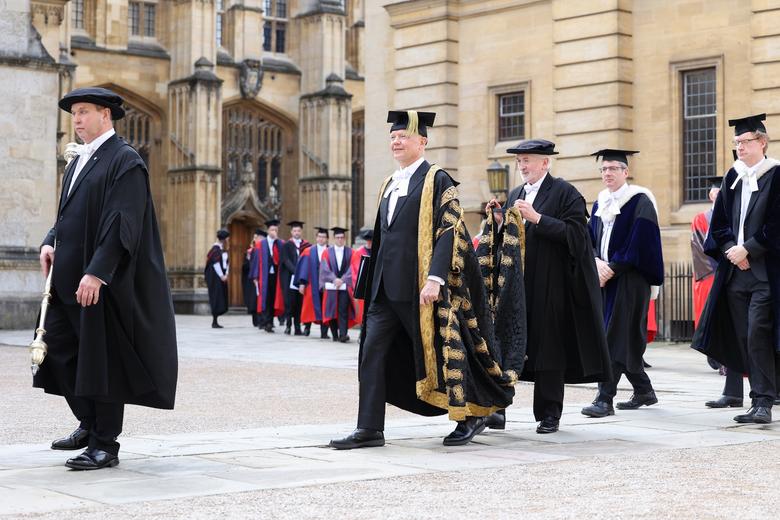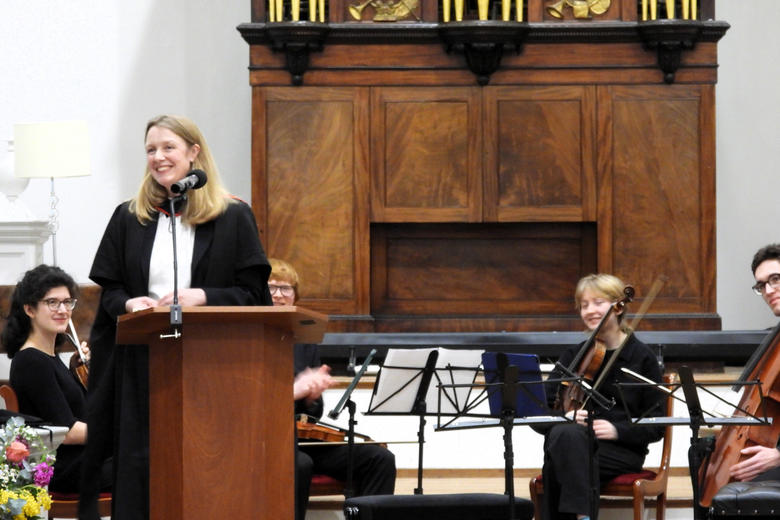ED BUSSEY

ED BUSSEY
One year in, the man leading Oxford’s largest investment venture company punctures myths and shares a vision
Published: 27 September 2024
Author: Richard Lofthouse
Share this article
'By the way I'm going to be here for the duration,' notes CEO of Oxford Science Enterprises (OSE) Ed Bussey somewhere deep into our sprawling discussion.
More than one of his immediate predecessors came and went in a matter of months, generating media speculation about the direction of one of the world's greatest university investment venture companies.
'Before I came, a consensus formed that the CEO role was impossible for one person. The OSE Board and the University fixed it by recruiting a Chief Investment Officer (CIO) role alongside me - Jack Edmondson - and we both began on September 1, 2023'.
Ed's likable. A military hair-cut, sporty tech watch, tangible warmth radiating a smile. He started at Emmanuel College, Cambridge, studying Natural Science in 1987. A period serving in national security roles for the UK government ensued, followed more recently by his building of three different disruptive tech ventures from scratch to exit. He says: 'I am drawn to seemingly impossible challenges.'
Hopefully it's not literally impossible, I reply - running one of the greatest experimental ventures of modern times, marrying the clout of roughly a billion dollars of venture money with sometimes moonshot IP-ventures arising mostly from University research, while respecting and rewarding some of the biggest, savviest and potentially least forgiving shareholders on earth - names like Google Ventures, M&G, Tencent, Lansdowne Partners, and multiple sovereign wealth funds including Singapore and Oman.
Ed explains that by 'impossible' he means that you can't solve problems by staying within the limits of conventional thinking.
OSE has three sectors it works with - deep tech, life sciences and health tech. The 55-plus active companies in its portfolio do not define the entirety of Oxford University's IP commercialisation, but they contain many exciting companies, some of which are two or three years away from what Ed describes as 'very exciting valuation inflection points.'
The verdict, one year in? 'What has checked out,' says Ed emphatically 'is that we have genuinely incredible companies that are solving many of the world's greatest challenges. It's inspiring - and the bottom line for me is that we need to do everything we can to help these founders succeed. As a former founder, I know first-hand the personal sacrifices that are invariably involved in building these companies, against the odds.'
From here, the conversation pivots to the myths about OSE that need puncturing, some the result of confused media coverage, and some the result of natural early stage evolution.
The first myth, says Ed, is that OSE has an exclusive gatekeeper position that prevents other investors from getting access to early stage companies resulting from Oxford University IP commercialisation.
In fact, OSE is independent of the University, structured as a PLC, and manages its own investment capital, but the University owns a 5%, 'golden' share of OSE, which cannot be diluted and is already a valuable asset.
'We have no exclusivity or special rights to invest in any company - once an academic has their IP license from OUI [Oxford University Innovation], then they can go to whichever investor they want to; that said, we'd love every academic to come and speak to us, and in practice, with our portfolio and our track record and the 55 people we have on the ground, we're well placed to spot the most exciting opportunities. But there's no compulsion for anyone to speak to us, or us to them. We need to win the most exciting opportunities by having the most compelling offer for future founders - I believe we do, but we need to communicate that better.'
Oxford University Innovation is Oxford's in-house tech transfer unit and the first port of call for any academic who thinks they might have IP with commercial promise. It is separate to OSE but the two organisations work closely together.
OUI also has a new, recently appointed leader, CEO Dr Mairi Gibbs (New College, 1991). Ed reports that they regularly have coffee and co-present together, he says, sharing the same ambition to rapidly grow Oxford's IP commercialisation.
Separate from OUI, and OSE, there are other funding mechanisms for spin-outs, such as seed money originating from rich individuals and publicly owned IP Group and its subsidiary Parkwalk Advisors, that runs the annual Oxford University Innovation Funds that have proven so popular with alumni investors.
Historically, these various routes to funding tend to criss-cross, with the founder of IP Group, in 1999, chess prodigy Dave Norwood (Keble, 1988) - later returning to Oxford to set up and lead OSE in its formative years.
Ed welcomes precisely this sort of diversity, of a wider ecosystem of investment mechanisms. OSE has to date brought in over 300 co-investors, with total capital deployed since OSE's launch in 2015 over £2 billion. Over $450 million has already been raised for OSE portfolio companies since January 2024 already.
That sum is a key, early achievement and destroys the myth that OSE is a closed shop. 'I can see where the myth originated but it's out of date - we're determined to correct the narrative by better communicating the facts' he says. 'It also makes economic sense - we want to bring in as many high quality investors, at all stages, as we possibly can - to validate our investment thinking, to share the capital load and to accelerate the growth of the wider Oxford ecosystem.'
If there's a second myth it relates to the way that OSE and the University take a share of equity in University-originating ventures. Some years ago, the idea got around that the University somehow gobbled up most of the spinouts' share capital, disincentivising the academic founder. But again, this is no longer the case.
Professor Chas Bountra, Pro Vice-Chancellor of Innovation at Oxford, says that if the IP is judged to have been very dependent on University resources then the University takes a 20% share in the venture. If less so, then it takes 10%. The founder is left with 80% or 90%.
'The University then gives half its share to OSE, so 10 or 5%. In return for this the University has its 5%, undilutable holding in OSE.'
The third myth, he says, is that 'The world thinks we are a fund - that we just write cheques, do nothing and then wait for a future payout. This couldn't be further from the truth. We have 50+ people on the ground here looking for spin-out opportunities. The most exciting ones invariably emerge from months of discussions and coffees in labs with academics who might not have a clear idea of what the commercial opportunity is. We then roll up our sleeves and spend the next 2-4 years working with the founders, to help build the company. Most investors just don't do this 'venture building' - but it's what we're great at and as a former founder I can see how we can take this unique capability to the next level.'
He immediately acknowledges that a Google search for OSE categorises it as 'Venture Capital.' 'Well I can see that's the search result. But that's not exactly what we are. We're taking a different approach - which we believe, based on our 9 years of experience and learnings - is more effective'.
'We are focussed on the very early concept stage, 'pre-seed'. That's where the risk is highest but also the potential reward. As a venture builder, we could be finding the lab space, sourcing the CEO, putting legals in place, developing the strategy. In short, we do a lot of heavy lifting taking the science from the lab to a standalone company. That core part of our proposition is not widely understood - and we need to do a better job communicating the value we bring in that regard.'
The US angle is another element of his strategy that he'd like to be judged on. 'Every single one of our companies needs to 'win' in the US so we're working on a fastrack solution and a physical presence, stateside'. OSE recently appointed MIT's Associate Dean of Innovation Dame Fiona Murray (Merton, 1986), to its Board.
Arriving at Oxford one year ago, Ed says that he and Jack prioritised visiting every single core portfolio company - not briefly but 'spending quality time, several hours, with each company's senior management team, to really understand their strategy, their challenges, and how OSE could better support them'.
It's not difficult to compute the giant workload behind all those visits, but the value of the effort is detectable in Ed's genuine enthusiasm and excitement for the companies and the 'global problems' they are trying to solve -from numerous health and medicine challenges to the application of Artificial Intelligence, both areas of Oxford pre-eminence.
The broader context of UK university IP commercialistion has been anything but static in recent months, with the publication in November 2023 of the Independent Review of University Spin-Out Companies. This was a review of university IP mandated by government and jointly published by Oxford Vice-Chancellor Professor Irene Tracey, and Dr Andrew Williamson, Managing Partner of CIC, an investment company focusing on the Cambridge ecosystem.
Not only did the government accept all the report's recommendations, but they are intended to create a more collaborative and sharing environment across different universities, entrepreneurship and investment, with licensing templates reducing duplication of effort, for example.
Ed says that while the macro-environment for fundraising has been challenging in recent years, there is light at the end of the tunnel. This optimism reflects the reforms of the previous Conservative Chancellor of the Exchequer Jeremy Hunt (Magdalen, 1985), and former Lord Mayor of London Nicholas Lyons, the Mansion House Compact that in 2023 committed ten of the UK's largest pension funds to invest 5% of their assets into private ventures by 2030.
The specific mechanism is the Long-Term Investment for Technology and Science (LIFTS).
The exact sum of money that will be unlocked by LIFTS is unknown but estimated to be in the region of £800 billion, of which 5%, or c.£50 billion is expected to flow into early stage venture investing, including the university IP sector.
Ed wants OSE's investment to rise five-fold to £1 billion in the next few years, while the contribution from LIFTS could make the annual investment sum £5 billion within a decade.
Ed wrote in The Times newspaper on July 5 following this year's UK General Election:
'The commercialisation of science and deep tech research, where British universities lead the world, should be at the top of the priority list for the incoming government.
The opportunity is huge; if the UK is going to create its first £1tn company, it is likely to emerge from the deep tech ecosystems around one of our leading universities. But it's time-limited, because the world's biggest economies, including the US and China, have already made their move.'
He says he wants a more, not less, interventionist government.
'Governments have generally and understandably been reluctant to pick technology winners - yet look at the competition: China on one hand, and then nearer to home France, whose government has recently given four government contracts worth €70m each to each of France's four leading quantum science start-ups. The UK has historically left everything to the market forces, which I don't think is a viable strategy in the increasingly challenging geo-political and economic context in which the UK is operating. The new government needs to quickly decide which areas of science and technology are critical to the UK's national and economic security - and then galvanise all of the relevant arms of government to support those companies that are leading those areas.'
The new government has yet to say much, but September saw a long-awaited capital markets report by Sir Nigel Wilson, The Capital Markets of Tomorrow, urging the government to be bolder in releasing capital towards British innovators.
Meanwhile, dozens of important companies and universities wrote to the government urging them to re-ignite the so-called Oxford-Cambridge Arc, the broad region estimated to create 7% of British GDP and often compared to Silicon Valley. That would re-resurrect plans to re-open the railway line between Oxford and Cambridge, for example.
The two public companies in which OSE still has active representation are Barinthus Therapeutics, the listed company that began as Vaccitech in 2016 and blazed the path to the Oxford COVID vaccine distributed by Astra Zeneca. It is now deep in clinical trials for two vaccines, one for Hepatitus B, the other for Celiac Disease.
The other one is PepGen, a clinical stage biotech company developing next-generation oligonucleotide therapies for patients with Duchenne's Muscular Dystrophy and other rare diseases. The company went public in May 2022 and has a very strong US presence in Boston, Massachusetts.
Perhaps the most famous Oxford success story is DNA Sequencing company Oxford Nanopore, begun in 2005 and floated sixteen years later in 2021.
There are of course older examples to celebrate, no less impressive, such as Oxford Instruments, founded in 1959 and subsequently listed on the London Stock Exchange in 1983, and Medisense, sold to Abbott Laboratories in the mid-1990s for around $800m, easily a unicorn in today's money.
Returning to the prospects of the current portfolio, Ed is just as keen to point out the tangible daily impact OSE companies are having and will have on individual lives. 'Each company is focused on driving meaningful impact in crucial areas - everything from cancer therapies aimed at helping people live longer and healthier lives, to crop yield technologies focused on feeding the world's expanding population, and quantum computing advancements set to revolutionise the entire computing industry. Alongside, fusion technology that is edging towards world-changing breakthroughs in energy generation. When I say that OSE's mission is to build companies that help solve the world's greatest challenges, I can genuinely stand by that - it's not just an empty marketing strapline - that is actually what we're doing.
The very recent news coming out of OSE supports this confidence. June saw med tech company Amber Therapeutics raise $100 million, while July saw Oxford Semantic Technologies acquired by Samsung Electronics. Oxford Ionics broke multiple world records for quantum performance and Beacon Therapeutics raised $170 million in Series B funding to develop ophthalmic gene therapies.
In summary the University of Oxford recently held on to the UK's no. 1 higher education institution position in the 2024 Beauhurst Spotlight on Spinouts report, with 210 spinouts created since 2011, of which 166 have attracted £4.69 billion in equity investment via 577 funding rounds.
It's a sprawling, daunting challenge, and some enterprises will fail as they inevitably do, or to recall the advice of Dave Norwood citing chess strategy, 'If you avoid failure you avoid success.' At the heart, nothing is impossible, but patience and eco-system matter. 'Never say impossible!' says Ed, with a grin.















